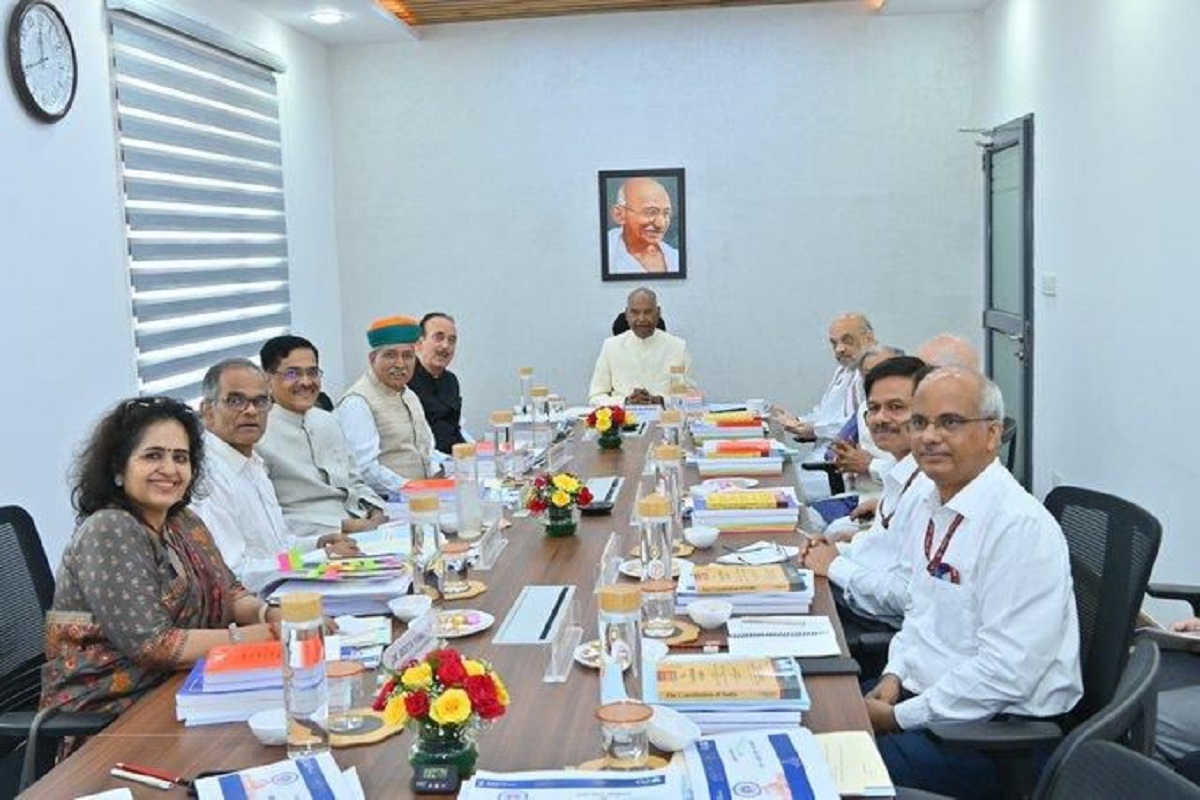“Working toward One Nation-One poll,” says PM Modi on Rashtriya Ekta Diwas
The Prime Minister was addressing the Rashtriya Ekta Diwas program in Kevadia, Gujarat.
The committee led by former president Ram Nath Kovind advocated elections to urban bodies and panchayats within 100 days.

Image tweeted by Doordarshan.
In a move that has far-reaching implications for the democracy in the country, the Centre has given its nod to simultaneous elections for the Lok Sabha and state assemblies recommended by the High-Level Committee formed to go into the proposal.
The committee led by former president Ram Nath Kovind advocated elections to urban bodies and panchayats within 100 days.
Advertisement
Following the approval of the committee’s recommendations by the government, a Bill on the simultaneous polls for the lower house and the assemblies is likely to be introduced in the forthcoming winter session of Parliament. Once cleared by both houses of Parliament, the Lok Sabha and the Rajya Sabha, it will become a law.
Advertisement
The Union Cabinet, chaired by the Prime Minister Narendra Modi, accepted the recommendations of the High-Level Committee.
The committee extensively consulted a broad spectrum of stakeholders, including political parties and experts, before preparing the report. It received extensive feedback indicating overwhelming support for simultaneous elections in the country.
Confirming the approval of the recommendations of the Covind Committee report by the Central government at a press conference here, Union Minister Ashwini Vaishnaw said, “The Union Cabinet has accepted the recommendations by the high-level committee on ‘One Nation, One Election. Cabinet approved the proposal unanimously.”
He said that the proposal would be implemented in two phases. “In the first phase, Lok Sabha elections and Assembly elections will be held simultaneously, and in the second phase, local body elections (panchayat and municipal polls) will be held within 100 days of the general elections,” the Union Minister said.
There will be a common electoral roll for all the elections.
Vaishnaw said recommendations of the Ram Nath Kovind panel would be discussed across India on various forums. “Implementation group will be formed to take forward the recommendations of the Kovind panel on simultaneous polls,” the Union minister said.
He further said that a large number of parties across the political spectrum have supported the ‘One Nation, One Election’ initiative. “When they interact with high-level meetings, they give their input in a very succinct manner and with a lot of clarity. Our government believes in creating a consensus on items that affect democracy and the nation in the long run. This is a subject, a topic that will strengthen our nation,” the Union Minister added.
The panel on ‘One Nation-One Election’, in its report, said frequent elections create an atmosphere of uncertainty and impact policy decisions. Simultaneous elections would bring enhanced certainty in policy making.
The report, comprising 18,626 pages, is an outcome of extensive consultations with stakeholders, experts and research work over 191 days, since the constitution of the High-Level Committee on September 2, 2023.
Highlighting the advantages of simultaneous elections, the committee stated that ‘One Nation One Election’ ensures ease and convenience to voters, avoids voter fatigue, and facilitates greater voter turnout.
The Committee was briefed by these bodies that intermittent elections have adverse consequences on economic growth, quality of public expenditure, and educational and other outcomes, besides upsetting social harmony.
The panel had submitted the report in March ahead of the announcement of the Lok Sabha elections. It recommended preparation for common electoral rolls and voter ID cards by the Election Commission (ECI) in consultation with state election authorities.
“Simultaneous polls will help save resources, remove the impediments and help realise the aspirations of “India, that is Bharat”, the panel said.
The idea of ‘one nation, one election’ was first proposed in the 1980s.
Previously, the simultaneous elections for the Lok Sabha and state assemblies were held in 1951-52, 1957, 1962 and 1967. However, the cycle was disrupted due to premature dissolution of some assemblies.
Advertisement